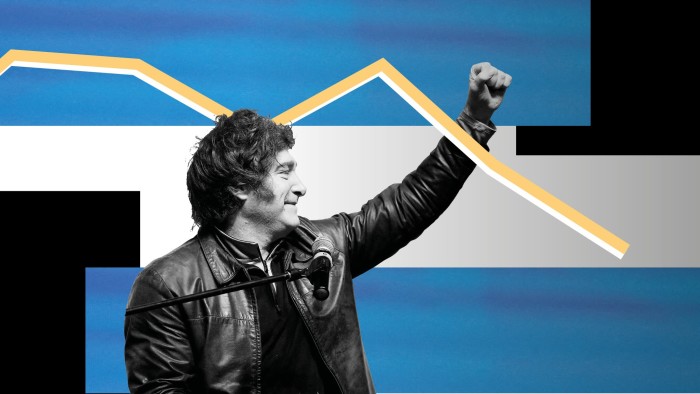Share this @internewscast.com
Less than half a year ago, US Treasury Secretary Scott Bessent visited Buenos Aires, lauding President Javier Milei for steering Argentina away from crisis. The libertarian leader had successfully secured over $40 billion in loans from the IMF and other multilateral institutions to reinforce his administration.
However, recent political and economic blunders have spurred panic in Argentine markets, putting the country back in a precarious position. In response, the Trump administration is preparing to assist its ideological partner once more.
To counter the sell-off of Argentine assets, Bessent declared on Monday that the Trump administration is “prepared to act as needed” to aid Argentina, stating that “all stabilization options are being considered”.
So how has Milei’s self-proclaimed economic miracle come so close to unravelling?
Milei, a libertarian economist inspired by free-market advocate Milton Friedman, initially achieved significant success. His severe austerity measures balanced the budget and drastically cut annual inflation, which fell from a peak of 289% in April 2024 to 34% in August.
However, economists highlight a significant oversight: Milei’s fixation on maintaining low inflation at any price resulted in an artificially strong peso. This approach hampered economic growth, increased imports, and blocked Argentina from accumulating enough dollars to manage its massive foreign debt.
“It’s a short blanket dilemma: the government focused too heavily on controlling inflation while neglecting reserves, leaving itself open to political upheaval,” explained Guido Sandleris, a former head of Argentina’s central bank and professor of economics at Johns Hopkins University and Torcuato di Tella in Buenos Aires.

That shock came on September 7, when Milei’s libertarians suffered an unexpected landslide defeat at local elections in Buenos Aires province, which is home to more than a third of Argentines and had been seen as a bellwether for national midterm elections on October 26.
The result hit markets already nervous about a corruption scandal ensnaring Milei’s sister and chief of staff, Karina, a breakdown of his alliances with the centrist opposition, and a series of erratic monetary policy moves, including interest rate increases, that boosted the peso but sapped economic activity.
The peso plunged almost 10 per cent in a fortnight, hitting the bottom of an exchange rate band adopted in April when Milei relaxed Argentina’s strict currency controls after securing a $20bn loan from the IMF.
Fears mounted among local investors that the government would have to abandon the band and devalue the peso, compounding demand for dollars and accelerating the run on the currency. The central bank spent $1.1bn in three days last week to prop it up.
The dollar sales, in turn, unnerved bondholders, who fretted that the government was burning through scarce hard currency reserves it may eventually need to repay debts, sending bond prices plummeting.
“The election loss pulled away the veil, revealing all the problems that had been hidden,” said Carlos Melconian, an economist and former head of Banco Nación, Argentina’s national bank, citing Milei’s “completely inconsistent” policies and his “lack of interest in political agreements”.
Milei was given some relief on Monday. Bessent’s offer of support, due to be discussed at a Tuesday meeting between him, Trump and Milei, helped calm markets, with the peso rebounding 6 per cent and yields on Argentina’s dollar debt, which move inversely to prices, falling 3.7 per cent.
At the same time, Milei announced a temporary elimination of Argentina’s big taxes on agricultural exports, incentivising exporters to sell some of billions of dollars’ worth of stockpiled crops and boosting the central bank’s access to dollars.
“They stopped the haemorrhaging,” said Nery Persichini, head of research at local financial broker GMA Capital, adding that Monday’s moves might be enough to keep the peso away from its lower limit ahead of the midterm elections, which would shield the central bank’s reserves.
But analysts warned US help, on top of the billions in multilateral loans Argentina has already received, would not solve the deeper political and economic challenges that drove Milei into crisis.

“You cannot fix Argentina at this point only with the availability of more international official financing,” said Alejandro Werner, director of Georgetown University’s Americas Institute. As head of the IMF’s western hemisphere department, Werner oversaw Argentina’s record-breaking $57bn bailout in 2018.
“Financing from the US will not be sufficient to stabilise Argentina unless a new political coalition is formed that will support Argentina’s economic programme,” he added.
Milei has alienated moderate opposition allies in congress through his aggressive local election campaign strategy. They have sided with the leftwing Peronist movement to approve a series of spending increases in recent weeks, unnerving investors.
The government’s efforts to rebuild alliances following the Buenos Aires drubbing have stalled, as powerful provincial governors wait to negotiate until after the midterms.
Joaquín Cottani, an economist who served as deputy to economy minister Luis Caputo for the first six months of Milei’s presidency and left over differences on currency policy, said US support “will only help” if the government also implements “consistent exchange rate and monetary policy”.
Those included floating the peso, implementing a plan to buy reserves, and controlling interest rates, he added. “I expect the Treasury will make those firm conditions of its support before it gives Argentina access to a single dollar.”








